
Richard and Leslie Scrushy
Federal prosecutors offered to let Richard Scrushy out of the Don Siegelman case if he agreed to testify in a way that would "give" them the former Alabama governor.Scrushy, the former CEO of Birmingham-based HealthSouth Corporation, said prosecutors gave him several examples of testimony that would help ensure a bribery conviction against Siegelman. None of the proposed statements was truthful, Scrushy said, so he refused the offer. He wound up being convicted and was released from federal prison last July after serving a six-year sentence. Siegelman was released from custody for several years to pursue appeals, but returned to prison last September after the U.S. Supreme Court refused to hear the case.
The latest revelations in the Siegelman saga came during Scrushy's interview last Thursday with San Francisco-based radio host Peter B. Collins. A one-hour podcast of the interview, Scrushy's first on the Siegelman case, can be heard in its entirety at peterbcollins.com. The former CEO, now a resident of Houston, Texas, makes it clear that prosecutors were willing to trample criminal procedure and simple rules of fair play in an effort to gain a conviction against Siegelman. Their tactics included a blatant effort to coerce false testimony from Scrushy, who was Siegelman's codefendant.
Scrushy called the case against him and Siegelman--and the actions of prosecutors--a "total farce, a total fraud." Perhaps nothing was more fraudulent than prosecutors' efforts to pressure Scrushy into concocting testimony that would amount to a quid pro quo ("something for something" deal) that is central to a federal bribery case, in the context of a campaign contribution.
The testimony that prosecutors wanted had a slight problem, Srushy said; he and Siegelman did not have a "something for something" deal. In fact, Scrushy repeatedly said during the Peter B. Collins interview that he did not want the Certificate of Need Board (CON) appointment for which he supposedly bribed Siegelman. Here is Scrushy from the Peter B. Collins interview:
I found myself in a conversation with my attorney, and he had prosecutors on the other line, and they said, "If Richard will give us the governor, we’ll let Richard out." They gave me four or five scenarios, and my lawyer said to go home and think about it. I said, “This isn’t going to take much time. I can’t see me sitting on a stand and swearing this man did something wrong when he didn’t do anything wrong."
Scrushy did go home and discuss the matter with his wife, Leslie. But she apparently could not believe that officials who are sworn to uphold the law would make such a proposal:
I went home to discuss it with my wife and said, “Leslie, honey, what do you think?” And she said, "You’re not going to lie on him are you?" And I said, "No, I’m not a snitch. I'm not going to say he did something that he didn’t do." So I called them back and said no, we’ll go to trial. I couldn’t believe they would find us guilty because we didn’t do anything wrong, and there was no evidence that we did anything wrong."
Despite the weak evidence against them, Siegelman and Scrushy were convicted--and Scrushy wound up with a graduate-level education in the way America's broken justice system really works. It all was driven, Scrushy says, by Bush White House strategist Karl Rove and his plan to eliminate prominent Democrats, especially in Republican strongholds such as Alabama:
There's no doubt Karl Rove wanted the governor. If I had been willing to do what they asked me to do and say things they wanted me to say, I would have walked out and I wouldn’t have gone to prison. I didn’t know Governor Siegelman that well, but I couldn’t get up and say the things they asked me to say because they were not true. To know he’s got two children and a wife . . . I couldn’t wake up every day the rest of my life and say, “Richard Scrushy, you are a liar and you know you put that man in prison.” I’m not going to do that.
Scrushy took a principled stand, but he paid a huge personal price. Meanwhile those who did testify against Siegelman, such as former aide Nick Bailey, received reduced sentences after pleading guilty to federal crimes. Said Scrushy:
I would rather spend five or six years in prison myself. My wife and kids suffered greatly. And I was in a horrible place, a place no man wants to go. But I feel better about myself. These other people put [Siegelman] in prison. He shouldn’t be in prison today. He was innocent. There was no corruption, no bribery.
(To be continued)
